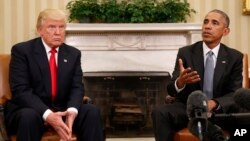"Obamacare is just blowing up," said then-U.S. presidential candidate Donald Trump at a campaign rally in Florida last month, telling his audience that health care costs could rise far past the levels the White House has forecast.
By his own estimation, Trump said, "you're talking about 60, 70, 80 percent increases, not 25 percent."
Trump went on to say, "Obamacare has to be repealed and replaced, and it has to be replaced with something much less expensive."
This line of thought was welcome to congressional Republicans, many of whom have been trying to get rid of the Affordable Care Act (ACA), nicknamed Obamacare, since it was instituted in 2010.
Changing position
But Friday, Trump, now president-elect, changed his position on the health care plan that pledges to give every uninsured U.S. citizen coverage. After a meeting with President Barack Obama, Trump said he is open to leaving key parts of the Affordable Care Act intact.
Trump told the Wall Street Journal on Friday that his 90-minute meeting with Obama -- longer than expected - made him reconsider his call for a total repeal of Obamacare.
In particular, he said he might try to keep the provision that allows parents to keep their young adult children on their insurance plans through age 26, and the ban on insurers denying coverage to people with pre-existing conditions.
But experts say the situation requires more than an outright repeal or a cut-and-paste of the health care elements Trump likes and dislikes.
"There are 22 million people who would be hurt, who would be without insurance, if the ACA is completely repealed," said Abbe Gluck, professor and faculty director of the Solomon Center for Health Law and Policy at Yale Law School. "When the rubber hits the road, it's going to be hard for the Republicans to take away 22 million people's health care."
Open to some parts of law
Gluck told VOA she thinks the Republicans, as well as Trump himself, may be open to preserving some of the existing health care law, once the ramifications of wiping out people's newly acquired health insurance make themselves clear.
"It's very hard to take insurance away from someone who has it, especially someone who's never had it before," she said.
But the problem with keeping the two provisions Trump says he likes, experts say, is that they are paid for by some other provisions that are less attractive, such as the mandate that all adults in the U.S. have health care coverage. The healthy adults in the system contribute the funds that help pay for the sick people who cannot be denied coverage.
Without that mandate, Gluck said Trump will have to find some other source of funds for the insurance companies covering people with pre-existing conditions.
"He's going to have to find some way to bring healthy people into the insurance market," she said. "It's too easy to say we're going to repeal the things we don't like and keep the things we do like, because all those provisions were integrated to support each other."
Democratic support
A complete repeal might not be that easy anyway - the Republicans in Congress have tried more than 60 times in the past six years to vote to defund the program, and have not been successful. Given Democrats' vociferous defense of Obamacare, Trump would need at least 60 votes in the 100-member Senate to ensure victory.
What could happen instead, Gluck said, is that a Trump presidency could allow for some tweaks to the existing health care system and maybe even work out some problems.
"Everybody thinks there are ways to improve the Affordable Care Act," she said.
More than 100,000 people signed up for healthcare the day after the election, according to the US. Department of Health and Human Services, indicating that people were worried that if they didn't sign up now, they wouldn't get to sign up at all.
Gluck said that involvement is an indicator that lawmakers’ constituents would not be happy with a sudden repeal without a replacement in place - a replacement Republicans have not been able to come up with so far.
"I think Republicans are looking at how to preserve some of that coverage," she said. "It would be a positive result if that happened."



